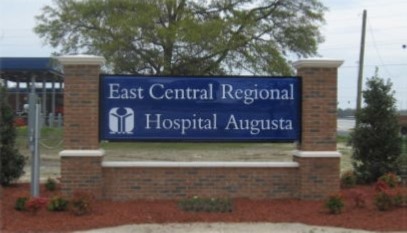Forensic Psychology Introduction
POSTDOCTORAL FELLOWSHIP IN FORENSIC PSYCHOLOGY
Augusta University/East Central Regional Hospital
The Fellowship in Forensic Psychology is offered through a partnership between East
Central Regional Hospital  (ECRH) and Augusta University (AU). The fellowship has two full-time positions available
each year. The 2022-2023 year will be our eleventh year and we are privileged to be
part of the psychiatry department at Augusta University where a high priority is afforded
to excellent clinical care and training.
(ECRH) and Augusta University (AU). The fellowship has two full-time positions available
each year. The 2022-2023 year will be our eleventh year and we are privileged to be
part of the psychiatry department at Augusta University where a high priority is afforded
to excellent clinical care and training.
ECRH is a state operated intermediate-security psychiatric hospital, while Augusta
University is a large publically operated medical school. Located in Augusta, Georgia
this fellowship program offers a year-long training sequence with a specialization
in public sector forensic inpatient (i.e., completed at the hospital) and outpatient
(i.e., completed with individuals who are incarcerated or on bond) evaluations. There
are also opportunities to be part of various civil evaluations conducted through Augusta
University and private practice. (e.g., fitness for duty, pre-employment for police
officers).
Fellows are given an opportunity to evaluate individuals who have been charged with
a wide-variety of criminal offenses, including: murder, aggravated assault, rape,
and child molestation. The fellowship offers specialized training in conducting competency
to proceed to trial, criminal responsibility (insanity), and violence risk evaluations.
Fellows who are interested will also have opportunities to conduct competency to stand
trial and  court-ordered psychological evaluations with juvenile offenders.
court-ordered psychological evaluations with juvenile offenders.
Fellows will have opportunities to conduct evaluations with diverse individuals covering
major diagnostic categories, including: psychotic disorders, mood disorders, personality
disorders, substance abuse, malingering, and intellectual disabilities. At the hospital,
there are two units that house 71 forensic individuals who are diverse in terms of
age, race, and socioeconomic status. Clinical training experiences include conducting
comprehensive assessments of competency to stand trial, criminal responsibility (insanity),
and violence risk. Fellows will be given the opportunity to testify and to observe
expert testimony provided by their supervisors. When a fellow is required to testify,
they will be accompanied to court by their supervisor. During the outpatient rotation,
fellows will conduct competency to stand trial and criminal responsibility evaluations
with adult defendants who are either incarcerated or out on bond. Fellows will also
be involved in annual civil commitment reviews, which are designed to provide the
Court with an individual’s progress over the proceeding year and to make recommendations
related to their appropriateness for continued outpatient commitment/conditional release.
Our forensic fellows are provided with extensive psycholegal education. These educational
opportunities include supervised forensic clinical experiences, involvement with a
multidisciplinary treatment team, weekly seminars in mental health case law/forensic
issues, and protected research time. Fellows who wish to be involved in treatment,
can work this into their schedules during the inpatient rotations. In these ways,
the fellowship embraces the tripartite model of education: clinical excellence, didactic
education, and scholarship. Gaining advanced knowledge in forensic psychology requires
exposure to a variety of criminal and forensic issues, training in case law, and didactic
seminars. Each fellow should finish the year well versed in public sector criminal-forensic
evaluations and gain knowledge grounded in scientific theory as it relates to criminal
forensic psychology. Our previous fellows have gone on to obtain outpatient/inpatient
forensic evaluator positions in several states, including Georgia, Colorado, Ohio,
and North Carolina. Additionally, several of our previous fellows are currently Board-Certified
in Forensic Psychology.